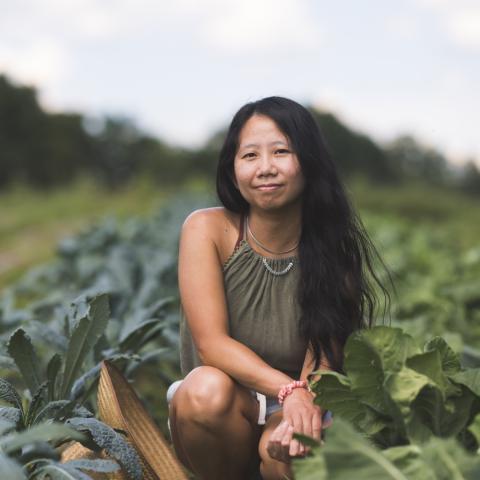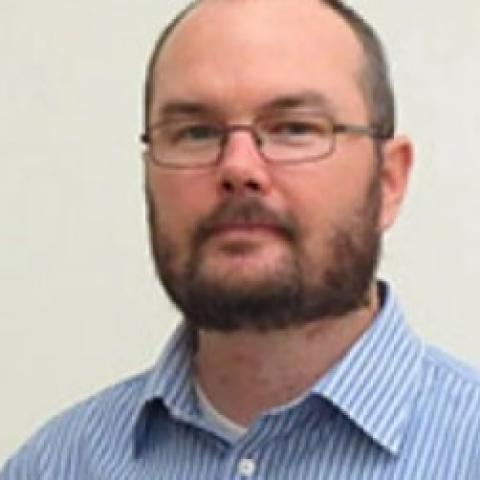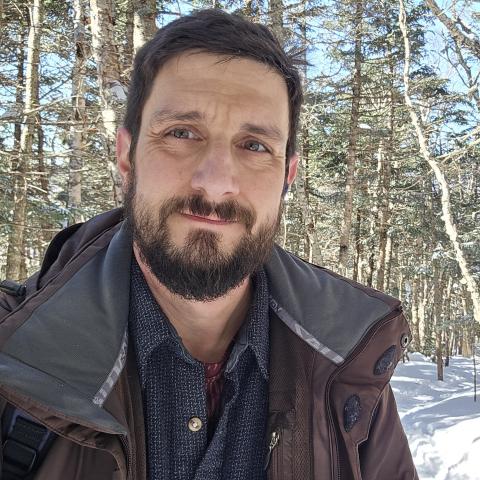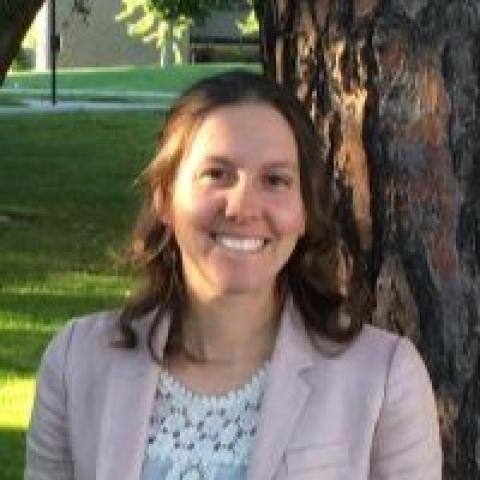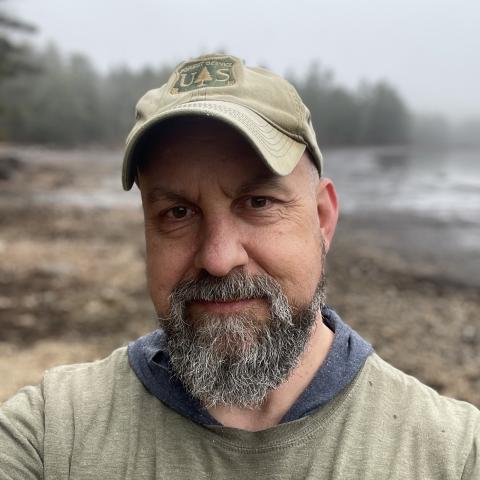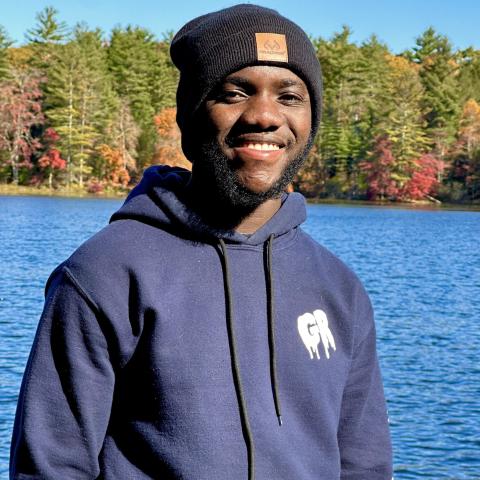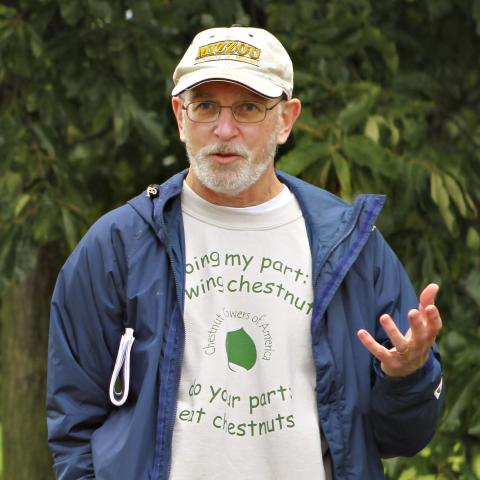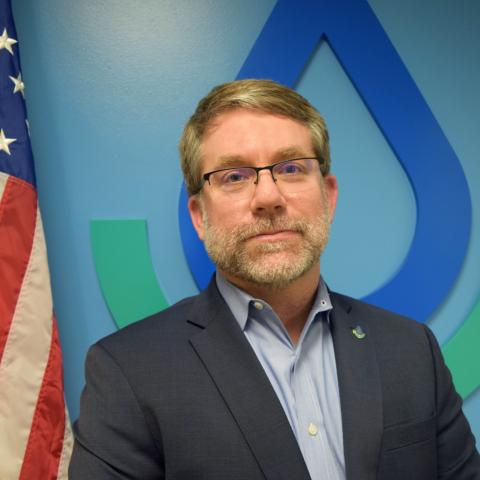Primary Investigators
Heidi Asbjornsen, Ph.D. | University of New Hampshire https://sites.usnh.edu/ecohydrology-lab/
Heidi Asbjornsen is an ecosystem ecologist who draws on diverse disciplines (plant physiology, ecohydrology, forestry) to understand how different ecosystems are responding to environmental change and then applies this knowledge to develop sustainable management practices. As the Principal Investigator of the ADAPT project, she is especially interested in supporting research to improve the design and implementation of diverse agroforestry systems in New England and promoting adoption of agroforestry practices through extension and educational programs. She is especially committed to participatory and inter(trans)disciplinary approaches that engage diverse project collaborators and stakeholders in the process of developing ADAPT’s integrated research, education, and extension program focused on agroforestry in New England.
Mark S. Ashton, Ph.D. | Yale University https://silviculturelab.yale.edu/
Mark S. Ashton studies the regeneration ecology of native forests, which includes tree seedling ecology; physiological and morphological adaptations of seedling leaves to their environment; and forest microenvironments, disturbance and landscape level dynamics of forests. Ashton applies this knowledge to regeneration silviculture of native forests, restoration of degraded forestlands, plantation analogs of mixed-species forests and agroforestry systems, and silviculture of non-timber forest crops. Ashton concentrates on all aspects of silviculture and forest ecology with a particular emphasis on native forests worldwide. Other areas of interest include management of forest carbon; the history, ecology and management of woodlands and wildlands; ecosystem services with particular focus on water and watershed management; and agroforestry and forest restoration systems as models for community development.
Ranjit Bawa, Ph.D. | University of New Hampshire
Ranjit Bawa’s research focuses on modeling and evaluating tradeoffs between economic returns and ecological outcomes in the context of land use change. His interests include the non-market valuation of natural resources and emerging approaches to pricing natural capital. As part of the ADAPT project, he is particularly interested in assessing the economic viability of temperate agroforestry systems and their role in sustainable land management.
Alix Contosta, Ph.D. University of New Hampshire https://eos.unh.edu/person/alexandra-contosta
Alix Contosta is an ecosystem ecologist who explores fundamental topics in ecology and biogeochemistry within the context of societal grand challenges. Key themes of her research program include changing winters and changing seasonality, declining resilience in natural and human systems, and interactions between land use and climate. Alix uses a combination of field experimentation, environmental sensing, and data synthesis to pursue her research agenda.
Kate Guerdat, Ed.D. | University of New Hampshire
Theresa W. Ong, Ph.D. | Dartmouth College https://sites.dartmouth.edu/ong/
Theresa W. Ong is Assistant Professor of Environmental Studies at Dartmouth College. She is broadly interested in agroecology and theoretical ecology and focuses on applying interdisciplinary approaches to studying transitions to agroforestry in the ADAPT project.
Steven Roberge | University of New Hampshire
Steven Roberge is the University of New Hampshire Cooperative Extension’s Forestry Specialist and Professor. In this role he oversees the system of county Extension foresters, coordinates outreach to forest owners and professionals and implements the State’s Forest Stewardship Program. Steve and his team provide stewardship options for forest owners to help manage the state’s private forestland. Steve earned a B.S. in Forest Science from the University of New Hampshire, a Masters of Forest Science from Yale University, and graduated from the Northeast Silviculture Institute for Foresters in 2017. At home, Steve tends to maples that he taps every spring and thinks about trees every day.
Project Managers
Aaron Guman | University of New Hampshire
Aaron Guman has worked as a grass fed beef farmer, an ecological landscape designer, a perennial farm researcher, and a nonprofit leader. In addition to supporting ADAPT as a Project Manager, he is working on a Master's degree in natural resources, focused on silvopasture. His ultimate goal is getting trees on farms in ways that benefit farmers, communities, and ecosystems.
Ryan Smith | University of New Hampshire https://www.linkedin.com/in/ryan-smith-rts48/
Ryan Smith is a forester who sees agroforestry as an exciting and underutilized land use due to its potential to simultaneously provide livelihoods, food production, and healthy ecosystem functioning in a shared landscape. Ryan has worked with family forest owners and farmers engaged in forest management, restoration, and agroforestry in temperate North America, tropical Latin America, and Sri Lanka. As a Project Manager for The ADAPT Project, he is grateful for the opportunity to work alongside the inspiring and innovative farmers who are leading the charge of reintegrating trees with agriculture in New England.
University Researchers
Analena B. Bruce, Ph.D. | University of New Hampshire https://www.unhfoodsystemslab.net/
Analena B. Bruce is the Director of the UNH Food Systems Lab and an Assistant Professor in the Department of Agriculture, Nutrition, and Food Systems at the University of New Hampshire. She is a sociologist with a research program on sustainable livelihood strategies for New England farmers and Values-Based Food Supply Chains designed to support equity, transparency, and resilience in the food system.
Mark Ducey, Ph.D. | University of New Hampshire
Mark Ducey is a forest biometrician and quantitative silviculturist. His research focuses on field methodology for forest structural measurement, long-term growth and development in complex forests, and linking field and remotely sensed data for improved ecological assessments and predictions.
Jess Gerrior, Ph.D. | University of New Hampshire https://linktr.ee/communitygardenscholar
Jess Gerrior is a food systems educator, researcher, and practitioner with experience in campus, community, farm, and nonprofit settings. Her expertise includes lived experience and scholarship in food access, food and environmental justice, community-based and participatory research, photovoice, and sustainability leadership.
Richard Smith, Ph.D. | University of New Hampshire
Matt Vadeboncoeur, Ph.D. | University of New Hampshire https://sites.usnh.edu/ecohydrology-lab/people/matt-vadeboncoeur/
Matt Vadeboncoeur is research faculty in the Earth Systems Research Center at UNH. He has experience in ecosystem ecology, plant ecophysiology, soil analysis, and the application of sensors in field experiments.
UNH Extension
Megan Glenn | University of New Hampshire Staff Profile
Jess Gerrior is a food systems educator, researcher, and practitioner with experience in campus, community, farm, and nonprofit settings. Her expertise includes lived experience and scholarship in food access, food and environmental justice, community-based and participatory research, photovoice, and sustainability leadership.
William Hastings | University of New Hampshire Staff Profile
William Hastings is a Cooperative Extension Production Agriculture Field Specialist in Coos County. He supports field crop, forage, and produce growers, helping them optimize production and sustainability. His work also includes exploring emerging crops and innovative production systems to enhance agricultural resilience and profitability.
Kristen Lyons | University of New Hampshire Staff Profile
Kristen Lyons (she/her/hers) has worked in the nonprofit field, specifically with youth and families, for over 20 years. She has a passion for youth development, with a special interest in resiliency and identity development. Kristen’s work with young people focuses on youth-adult partnership,
Wendy Scribner | University of New Hampshire Staff Profile
Wendy Scribner serves as a field specialist in forestry and natural resources in Carroll County, and she is also known as the Carroll County Forester. Wendy provides landowners, communities, and others with assistance on managing their woodlots. Topics include enhancing wildlife habitat, improving forest and tree health, developing management plans, selling timber, and controlling invasive plants. Wendy is a licensed forester in both NH and Maine and holds a Bachelor’s and Master’s Degree in Forestry from UNH.
Michael Smith | University of New Hampshire https://newhampshire.agclassroom.org
Michael Smith is a program manager with 4-H Youth Development specializing in Community Agriculture and educator training. This dual role has him working jointly as the New Hampshire Agriculture in the Classroom state coordinator, helping to facilitate ag literacy in schools. As a former long time high school science teacher, with degrees in Horticulture and Environmental Science, Mike helps bring real world experience to colleagues in the education field to further understanding of agricultural principles as applied to the New Hampshire landscape.
Wade Weber | University of New Hampshire Staff Profile
Wade M. Weber is an Extension Field Specialist in Positive Youth Development for UNH Extension and serves as the New Hampshire State 4-H Youth Development Program Leader. Prior to his service at UNH, he has served as Assistant Dean in the Kansas State University Office of Student Life, Department Head for 4-H Youth Development at Kansas State University, and Youth Development Specialist and Team Leader at Iowa State University. Weber is an expert in growing sustainable communities of youth development through youth/adult partnerships, career exploration, engaged learning methods, community coalition building, navigating difficult community and interpersonal conversations, personnel management, and fund development. The ADAPT project combines Weber’s love for human development and creating sustainable human systems with his love for nature!
Partner Researchers
John Gunn, Ph.D. | The Nature Conservancy
Randy Kolka, Ph.D. | USDA Forest Service https://research.fs.usda.gov/about/people/kolka
Randy Kolka is a Research Soil Scientist with the USDA Forest Service Northern Research Station in Grand Rapids, Minnesota. He is adjunct at 5 universities and has published more than 290 scientific papers. Kolka is contributing to assessing the soil response of the various land management alternatives of the ADAPT project.
Erin Lane | USDA Forest Service https://www.climatehubs.usda.gov/hubs/northeast
Erin Lane is the Director of the USDA Northeast Climate Hub. The NE Hub works to develop and deliver tools, information, and resources to support farmers, foresters and land managers in our region.
Nathan Siegert, Ph.D. | USDA Forest Service
Nathan Siegert provides a wide range of forest health leadership and technical assistance with forest insects to federal, state and university partners and land managers. He is broadly interested in the ecological aspects of plant-insect interactions, population dynamics of forest insects, and invasive species biology in forested systems.
Matthew M. Smith, Ph.D. | USDA National Agroforestry Center https://www.linkedin.com/in/matthew-m-smith/
Matthew M. Smith is a Research Ecologist with a background in agroforestry, agroecosystems, forestry, waste-to-energy systems, and natural resource management. This interdisciplinary background ultimately led Dr. Smith to the USDA National Agroforestry Center. As the Research Program Lead, Dr. Smith works with a group of scientists to provide national leadership in agroforestry, which encompasses a suite of land management practices used to enhance the economic and environmental benefits that occur when trees are deliberately integrated into agricultural landscapes.
UNH Extension
Postgraduate Fellow
Bernard Nyanzu | Yale University
Bernard Nyanzu is an agroforestry researcher with a master’s degree in forestry, interested in developing sustainable agroforestry practices that enhance food production while sustaining and improving ecosystem functions and services. With expertise in forestry, GIS, and applied research, Bernard focuses on integrating silvicultural techniques with agricultural systems to support climate resilience, biodiversity conservation, and sustainable resource use.
Graduate Students
Krystal J. Bagnaschi | Dartmouth College
Krystal J. Bagnaschi is a Ph.D. student in Dartmouth's Ecology, Evolution, Environment and Society program, studying agroforestry through forest and political ecology lenses. Their research explores the social, spatial, and ecological boundaries between forest and farm, and the actors that challenge these divisions. They draw on experience managing and researching diverse forest and agricultural systems from Costa Rica to Shenandoah to New England.
Umama Begum Ruba | University of New Hampshire https://sites.google.com/view/umamabegum/about?authuser=0
Umama Begum Ruba is a Ph.D. student with strong research interests in food systems concerning food security and sustainable livelihood strategies. Her involvement with the ADAPT project is advancing the socio-cultural and livelihood aspects to enhance the development of agroforestry systems and practices across the Northeast. She is looking at driving values and goals of the early practitioners and how social networks, capital, and personal resources fit into the livelihood strategies of the adopters.
Jannatul Ferdous | University of New Hampshire
Jannatul Ferdous’ passion for nature is rooted in her dedication to soil health, recognizing it as essential to environmental sustainability. With expertise in plant nutrient dynamics and greenhouse gas mitigations, she is currently pursuing her Ph.D. under the ADAPT project. Her research focuses on advancing climate-smart agricultural practices to reduce greenhouse gas emissions while preserving soil health, contributing to a more sustainable future.
Laurie Mooney | University of New Hampshire
With 15 years practical farming experience and training in Landscape Architecture and Sustainable Agriculture Systems, Laurie Mooney began her PhD studies Spring '25 working with Heidi Asbjornsen and specifically studying Food Forest Agroforestry Systems within New England forest biome.
Sajja Panta | University of New Hampshire https://www.linkedin.com/in/sajja-panta-41a445216/
Sajja Panta is a Ph.D. student in Natural Resources and Earth Systems Science at the University of New Hampshire, with a background in forestry and a research focus on non-market valuation. She is studying the economic value of agroforestry products by estimating willingness to pay (WTP) and willingness to accept (WTA). As part of the ADAPT project, she looks at the socioeconomic factors influencing agroforestry adoption in New England, using economic modeling and consumer insights to inform sustainable land management and policy development.
Research Technicians
Aaron Hoag | University of New Hampshire https://www.linkedin.com/in/aaron-j-hoag/
Aaron Hoag is a research technician for the ADAPT project. He graduated from the University of New Hampshire with a B.S. in Sustainable Agriculture and Food Systems with an emphasis in Integrated Pest Management.
Advisory Board
CJ Buzzy| Propagate https://www.linkedin.com/in/cjbuzzy/
Bernard Nyanzu is an agroforestry researcher with a master’s degree in forestry, interested in developing sustainable agroforestry practices that enhance food production while sustaining and improving ecosystem functions and services. With expertise in forestry, GIS, and applied research, Bernard focuses on integrating silvicultural techniques with agricultural systems to support climate resilience, biodiversity conservation, and sustainable resource use.
David Foster, Ph.D. | Harvard University
Michael Gold, Ph.D. | University of Missouri https://centerforagroforestry.org/michael-gold-phd/
Michael A. Gold is a Research Professor at the University of Missouri Center for Agroforestry. He is the Agroforestry Graduate Emphasis Area Coordinator for the School of Natural Resources and advises many online agroforestry graduate students. Gold’s research focuses on development of market and consumer knowledge for specialty crops (e.g., chestnut, elderberry, pawpaw). He teaches a graduate agroforestry course as part of the Center’s, 100% online, Agroforestry M.S. program. He is active in the Center’s outreach and training programs including the Center’s annual Agroforestry Academy.
Shibu Jose, Ph.D. | University of Missouri
Anne S. Marsh, Ph.D. | USDA National Agroforestry Center
Dr. Anne S. Marsh is Director of the National Agroforestry Center at the USDA Forest Service, where she leads a team that conducts, coordinates, and catalyzes research and science-based outreach to advance the adoption of agroforestry. An expert forest ecology and resilient forest and agricultural practices with a B.A. in Environmental Planning (Williams College) and a M.F.S. and Ph.D. in Forest Science/Plant Physiological Ecology (Yale University), she has served as the Forest Service’s National Program for Climate Change Research, and held positions at Johns Hopkins University, The H. John Heinz Center for Science Economics and the Environment, and the Smithsonian Environmental Research Center. She is pleased to support this important regional project.
John Munsell, Ph.D.| Virginia Tech https://frec.vt.edu/people/munsell.html
John Munsell is a Professor in Virginia Tech’s Department of Forest Resources and Environmental Conservation where he has taught agroforestry for over 15 years. He was President of the Association for Temperate Agroforestry from 2015-2017, served as an Associate Editor for Agroforestry Systems for more than 10 years, and co-authored The Community Food Forest Handbook published by Chelsea Green. In 2019, John received the Outreach and Education Award from the Association for Temperate Agroforestry for extraordinary accomplishments in the field of agroforestry engagement. He also leads annual advanced silviculture training for federal agency foresters from across the country.
Alain Olivier, Ph.D | Laval University
Alain Olivier is a full professor in the Faculty of Agricultural and Food Sciences at Université Laval, Québec, Canada. He is director of the Interdisciplinary Research Group in Agroforestry and of the Master's degree in Agroecology at Université Laval. In 2022, he co-chaired the 5th World Congress on Agroforestry, where he also acted as Chairman of the Scientific Committee. His research program focuses on the analysis of constraints and incentives to the implementation of agroforestry systems, from an interdisciplinary perspective, including technical, ecological, social, economic and policy aspects.
Starry Sprenkle-Hyppolite, Ph.D. | Conservation International https://www.linkedin.com/in/starry-sprenkle-hyppolite-ph-d-bb0a9271/
Starry Sprenkle-Hyppolite is a restoration ecologist specializing in tree restoration and agroforestry. She is the Senior Director of Restoration Science for Conservation International, supporting science-based tree restoration and quality monitoring across the tropics. Starry has published peer-reviewed papers mapping the Carbon Dioxide Removal “ecosystem,” the climate mitigation potential of increasing tree cover in agriculture, and predicting areas of natural forest regeneration. Before joining CI, she spent 15 years working in the humanitarian-development nexus in Haiti, including launching a successful community-based agroforestry program in the Artibonite Valley in 2005, which is still working and has helped people to plant more than 5 million trees.
Matt Walker | USDA Natural Resources Conservation Service
USDA-NRCS Maine State Conservationist Matt Walker is committed to “helping people, help the land” with technical and financial assistance as they address natural resource concerns throughout the state of Maine. Raised in the agricultural tobacco country of Western Kentucky, he grew up with an appreciation and understanding of the value of natural resource conservation, and subsequently entered a career that would allow him to help America’s farmers and landowners preserve those resources. Walker has served in many technical positions in the agency working in Kentucky, Montana, Hawaii, Tennessee, National Headquarters, and Maine, and he particularly enjoys working in forest ecosystems.






